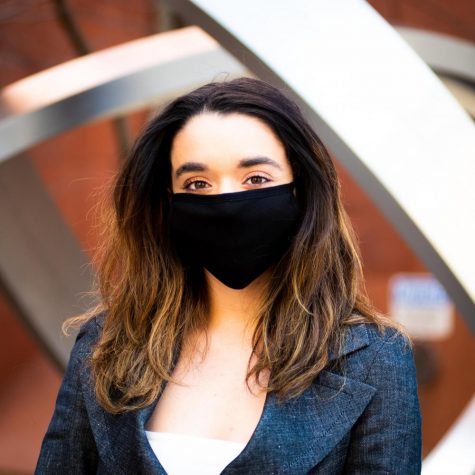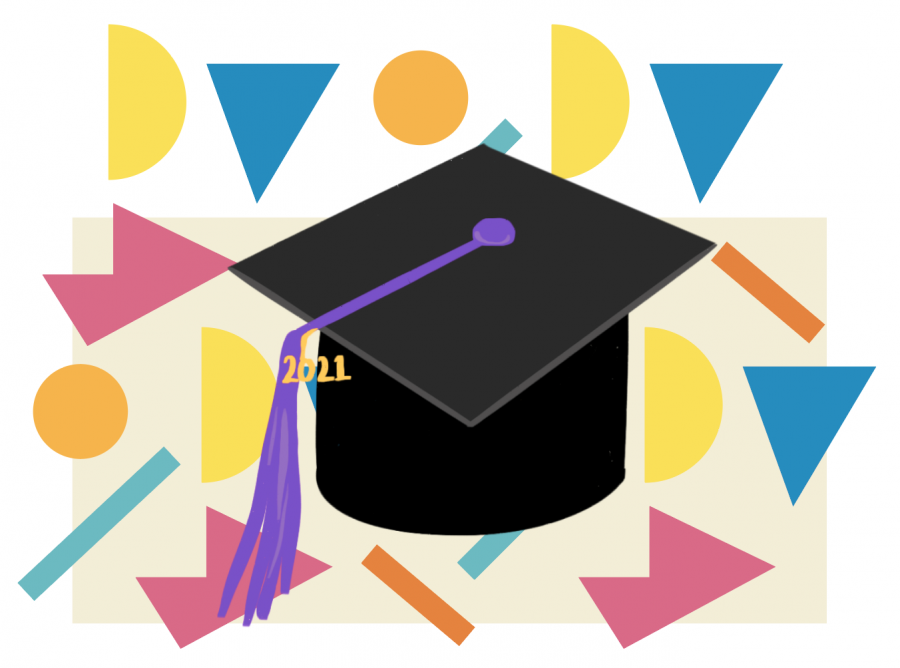Milestones
An NYU senior reflects on her own personal growth, as well as the growth of everyone around her during a time of loss and uncertainty.
A graduating NYU senior muses on her experience with personal growth. (Staff Illustration by Susan Behrends Valenzuela)
After more than a year of pandemic life, everyone has experienced a quarantine birthday. We have adjusted our expectations around celebrations. As an NYU senior, I have already grieved the loss of in-person graduation and tucked my cap and gown into the back of my closet. Like many other seniors, I had another celebratory event overturned by the pandemic: my 22nd birthday.
Turning 22 isn’t conventionally considered a milestone. You can get your driver’s license at 16. You can buy a lottery ticket at 18 (and vote, but statistically you won’t). You can drink legally at 21. But turning 22 doesn’t grant you any grand gesture to declare your newfound maturity, aside from quoting Taylor Swift in your Instagram caption. It’s the age most students graduate college, though. Although you’re legally an adult at 18, you become a real adult at 22: finishing college, moving out of your parents’ house or getting your first real job. It is a day to commemorate, if only with internal acknowledgment of your future possibilities.
But with social distancing, finals and already-lackluster expectations, I marked the occasion with hours of homework, pastries and old Spotify playlists. As I walked to my favorite coffee shop for that carbohydrate fix, I passed through Washington Square Park and pressed shuffle. Through the almighty powers of the universe or the Spotify algorithm, I got one of my favorite songs from high school, “Your Body Is a Weapon” by The Wombats.
I hadn’t heard the song in ages, but I sang along to every line. As I carefully avoided walking underneath the Arch, I stopped myself before accidentally belting out the words to the bridge: “I don’t come here for the exclusivity/I just come here for the view/And the miniscule chance of some close proximity/Or an awkward conversation with you.”
As I heard those lyrics, I was back in my sophomore year of high school. I had an embarrassing crush on the popular boy who barely acknowledged me. Every day, we would exit class into the same hallway. I would pack up my books slowly so we could walk out of the door at the same time. I wouldn’t speak to him, though. I would just follow slightly behind and hope he’d turn around, or at least, see me out of the corner of his eye, so I could casually smile and wave. In retrospect, my borderline-stalkerish behavior was simultaneously sweet, stupid and sad, perfectly encapsulating who I was at 15.
I hadn’t thought about this boy or my hallway nonsense since, but the song still held memories. Even at 22, my earbuds are another limb and lyrics are a guiding force in my life. What I couldn’t decipher was why these words that represented teenage awkwardness felt perfect for turning 22.
Birthdays are always nostalgic, benchmarks that force reflection on personal growth. My nostalgia was only amplified by my anxiety about an impending graduation. Yet as I walked through the campus that had become my home, I wasn’t reminiscing about my favorite college memories, contemplating my feelings about saying goodbye or memorializing the resident park rats. Instead, I was fixating on some guy who hadn’t crossed my mind in six years.
When I finally sat down in the coffee shop and opened my laptop to attempt expressing the unique circumstances of graduating college during a pandemic, I realized what was so special about that song and the memory of my schoolgirl crush. It represented a time of innocence in one’s life — when you couldn’t form sentences around someone you like, when one smile or wave would make your day, when everyday moments felt like coming-of-age scenes from an ’80s teen rom-com.
Graduating college and growing older can feel like a loss of youthful bliss. Shedding the final remnants of adolescence may make you romanticize a time when your biggest anxiety was whether your crush would text you back. And if you’re like me, your coping mechanism will be blasting 2010s alt-pop.
Many seniors may not view graduating this year as a loss of innocence, but I do. Before the pandemic, I would have pointed to numerous incidents throughout my life as the moment I lost my naivete — the first time I cleaned someone else’s drunken vomit, experienced a psychotic episode or wept over an open casket. I would have defined that mental shift as when I was sexually assaulted, unable to pay my rent or told I might fail out of school. For my fellow graduates, after four years of college screw-ups, adulting challenges, toxic relationships and the trials of living in New York City, we may feel we lost our innocence a long time ago.
Even though I have always expected the worst, this pandemic exposed me to new blind spots in my hardened worldview. We have lost so much over the past year. We have experienced quantifiable losses like loved ones, financial security and social interaction, as well as more abstract ones like freedom, stability and normalcy. But what is the sum of these individual pains? For many, this crisis is the first time everything has been taken away at once. Instead of one slap in the face from the universe at a time — the death of a loved one or the loss of a job — our whole world was altered in an instant. This sudden upending conjures a special kind of grief.
Acknowledging life’s instability can be beautiful, too. It adds a new dimension to your future plans. When you know that everything can change, you are compelled to use your time and energy better. While I cringe as I write it, this principle can be summarized as YOLO. But in a time associated with restriction, identifying the areas of freedom is essential.
Changing your worldview can offer a blank page for life going forward. As a writer and someone who hates uncertainty, a blank page is the scariest thing in the world. You have a choice — litter it with your tears or write your triumphs. When you open yourself up to the possibilities life has to offer, you can be more purposeful with your decisions. And if you allow yourself to question the path laid for you, you are better equipped to deal with unexpected changes.
These lessons are invaluable for graduating students, and I have been astounded by those who have adapted to changing circumstances and grown in an era of limitation. They have discovered new aspects of themselves. Some have decided to completely change their self-expression or direction for their lives, developing a newfound sense of purpose.
Some of these insights stem from a place of pain. Over the past year, I have often heard pundits refer to the pandemic as a “trying time.” Yes, it’s trying. It’s also traumatic. We have all had to grieve for something, even if only jumping in the fountain of Washington Square Park on graduation day. Personally, I have also grieved for the future self I thought I would be when I received my diploma, a person who was more confident or accomplished.
Like most of the world, I have also been affected by more than one death during the pandemic. The hardest hit was the passing of my uncle, a vibrant man who brought light into the lives of everyone he met. But the loss that currently weighs on my mind is an old friend. He was an NYU senior who battled his demons and lost, a fate I’ve witnessed others at this university suffer before him. At the start of my college career, he threw me into a period of darkness that contributed to one of the loss-of-innocence moments mentioned above.
For some reason, during a time of celebration and possibility, the death of someone who had caused me pain weighed more heavily than that of someone who had brought me joy. I learned about his death the day before my birthday. As I drank my coffee and celebrated 22 years, a milestone he would never share with me, I realized I was ruminating on how much potential he had. Not just to “succeed,” but also to overcome his internal issues. I thought he had time to grow, another area of naivete that’s vanished.
So as I mourn and decipher these complex emotions, I am also trying to learn from him and this concept of potential. Because that’s how I view myself and my fellow seniors. Regardless of my personal feelings about them, I see all the potential we have in this life. I see beyond the things we can accomplish with an NYU degree to the people we can become.
As we receive our vaccinations, hug our loved ones again and walk in the world with less mortal terror, we should reflect on the changes that occured in this world and in ourselves. I don’t want us to emerge into the post-pandemic world defining our next steps by what we have lost. These trials have given us insight to apply to the world’s emerging possibilities. To draw from either Roman philosopher Seneca or modern philosopher Oprah, luck is when preparation meets opportunity. In that sense, this graduating class is really lucky.
Let’s use the remainder of this time of limitation for reflection, self-improvement and ambitious plans. As pieces of normalcy return, it is tempting to rush into old patterns of behavior that were holding us back. We can swing to the opposite end of the pendulum. Now is the time for balance. Don’t forget what you’ve learned through the hardships of this pandemic. Because as you leave your house and leave this university, you have so many opportunities in front of you. Even if you can’t recognize it yet, you have grown stronger through this ordeal.
Email Abbey Whelan at [email protected].

Abbey is a Gallatin senior researching the socio-cultural impacts of media and its potential for education and social change. She is minoring in Child...























































































































































